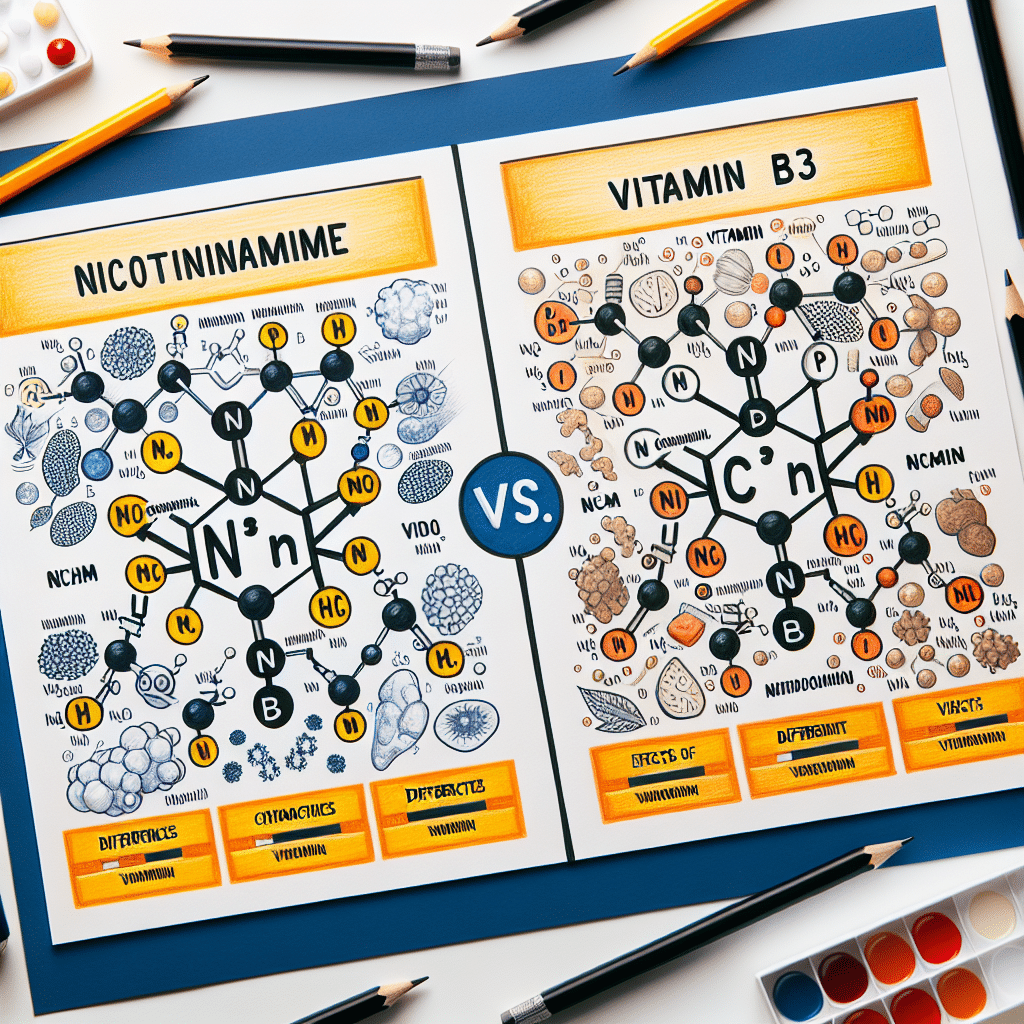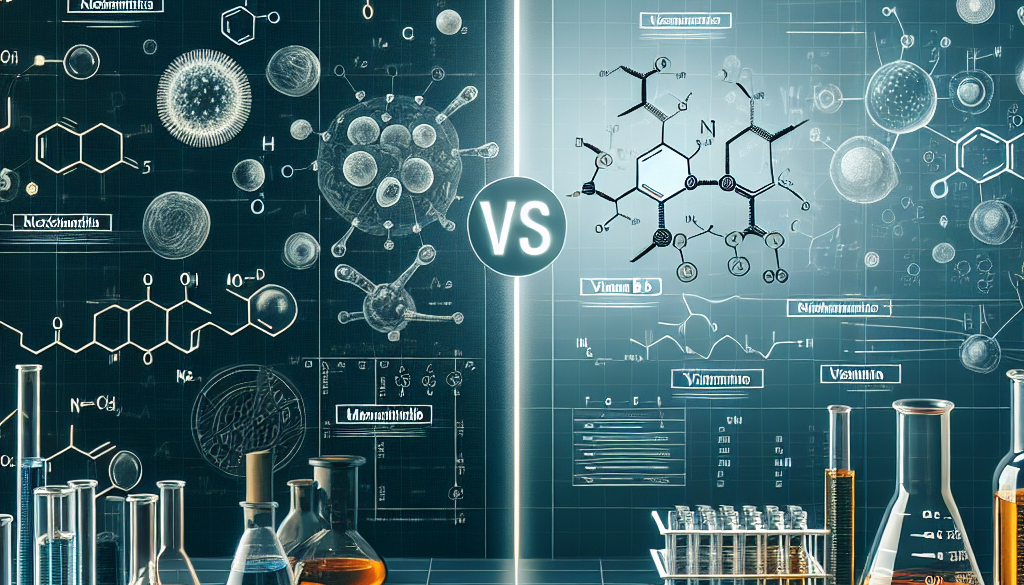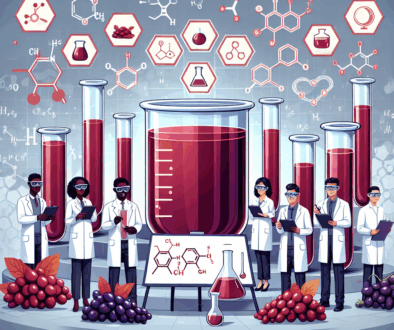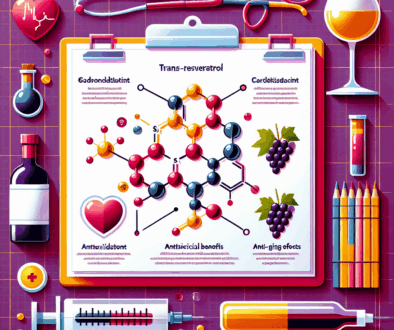Nicotinamide Mononucleotide vs B3: Differences
-
Table of Contents
- Nicotinamide Mononucleotide vs B3: Understanding the Differences
- What is Nicotinamide Mononucleotide (NMN)?
- Understanding Vitamin B3
- Key Differences Between NMN and Vitamin B3
- Scientific Research and Case Studies
- Supplementation and Dosage
- Conclusion: Balancing NMN and Vitamin B3 for Optimal Health
- Enhance Your Health with ETprotein’s Premium Protein Products
Nicotinamide Mononucleotide vs B3: Understanding the Differences

As the quest for health and longevity continues to drive scientific research, the spotlight often falls on dietary supplements and their potential benefits. Among these, Nicotinamide Mononucleotide (NMN) and Vitamin B3 have garnered significant attention. While both are related to the body’s metabolic processes, they are not the same. This article delves into the differences between NMN and Vitamin B3, exploring their functions, benefits, and the role they play in health and wellness.
What is Nicotinamide Mononucleotide (NMN)?
Nicotinamide Mononucleotide is a nucleotide derived from ribose and nicotinamide. It is a precursor to Nicotinamide Adenine Dinucleotide (NAD+), a vital coenzyme in all living cells that plays a crucial role in energy production and regulation of cellular processes. NMN has been studied for its potential anti-aging effects and its ability to boost NAD+ levels, which naturally decline with age.
Understanding Vitamin B3
Vitamin B3, also known as niacin, is one of the eight B vitamins. It is essential for converting food into energy and has several other important roles in the body, including DNA repair and skin health. Vitamin B3 comes in three forms: niacin (nicotinic acid), niacinamide (nicotinamide), and inositol hexanicotinate, each with different effects on the body.
Key Differences Between NMN and Vitamin B3
- Chemical Structure: NMN is a larger molecule that contains a nicotinamide group, a sugar (ribose), and a phosphate group. Vitamin B3 refers to the simpler forms of niacin and niacinamide, without the additional phosphate and ribose components.
- Biological Role: NMN is a direct precursor to NAD+, meaning it is one step away from converting into this essential coenzyme. Vitamin B3, in its various forms, also contributes to the production of NAD+ but through different pathways in the body.
- Health Benefits: While both NMN and Vitamin B3 are linked to energy metabolism and potential health benefits, NMN is specifically researched for its anti-aging properties and ability to increase NAD+ levels effectively.
- Research and Studies: NMN is a relatively new subject in the field of nutritional science, with emerging research focusing on its effects on aging and longevity. Vitamin B3 has been extensively studied for decades and is well-known for its benefits and recommended daily intake.
Scientific Research and Case Studies
Several studies have highlighted the potential benefits of NMN and Vitamin B3. For instance, research on NMN has shown promising results in improving age-related metabolic disorders and enhancing muscle endurance. On the other hand, Vitamin B3 has been proven to help lower cholesterol levels and reduce the risk of cardiovascular diseases.
A notable case study involving NMN is the research conducted on mice, which demonstrated that NMN supplementation could reverse age-related decline in energy metabolism and improve insulin sensitivity. While human studies are still limited, these findings suggest a potential for NMN in promoting healthy aging.
In contrast, Vitamin B3 has been used in clinical settings to treat niacin deficiency, known as pellagra, and to manage cholesterol levels. Its role in human health is well-established, with recommended daily allowances set to ensure adequate intake.
Supplementation and Dosage
When considering supplementation, it’s essential to understand the recommended dosages and potential side effects. NMN supplements are available in various forms, including capsules and powders, with dosages ranging from 250mg to 500mg per day. However, as research is ongoing, there is no official recommended daily intake for NMN.
Vitamin B3 supplements, on the other hand, have established daily values. The recommended daily allowance for adults varies from 14mg to 18mg, with higher therapeutic doses used under medical supervision for specific conditions.
Conclusion: Balancing NMN and Vitamin B3 for Optimal Health
In summary, while NMN and Vitamin B3 are related in their roles in energy metabolism and NAD+ production, they differ in structure, function, and the extent of research supporting their use. NMN holds promise as an anti-aging supplement, while Vitamin B3 is a well-established nutrient with a wide range of health benefits.
For those interested in exploring the potential of these compounds, it’s crucial to consult with a healthcare provider, especially when considering higher doses or long-term supplementation. As research continues to evolve, the understanding of NMN and Vitamin B3 will deepen, potentially leading to new insights into their roles in human health.
Enhance Your Health with ETprotein’s Premium Protein Products
If you’re looking to complement your health regimen with high-quality protein sources, consider ETprotein’s range of organic bulk vegan proteins and L-(+)-Ergothioneine. Their products are non-GMO, allergen-free, and boast a neutral taste, making them an excellent addition to any diet. Whether you’re involved in sports nutrition, weight management, or general wellness, ETprotein offers tailored solutions to meet your protein needs.
About ETprotein:
ETprotein, a reputable protein and L-(+)-Ergothioneine (EGT) Chinese factory manufacturer and supplier, is renowned for producing, stocking, exporting, and delivering the highest quality organic bulk vegan proteins and L-(+)-Ergothioneine. They include Organic rice protein, clear rice protein, pea protein, clear pea protein, watermelon seed protein, pumpkin seed protein, sunflower seed protein, mung bean protein, peanut protein, and L-(+)-Ergothioneine EGT Pharmaceutical grade, L-(+)-Ergothioneine EGT food grade, L-(+)-Ergothioneine EGT cosmetic grade, L-(+)-Ergothioneine EGT reference grade and L-(+)-Ergothioneine EGT standard. Their offerings, characterized by a neutral taste, non-GMO, allergen-free attributes, with L-(+)-Ergothioneine purity over 98%, 99%, cater to a diverse range of industries. They serve nutraceutical, pharmaceutical, cosmeceutical, veterinary, as well as food and beverage finished product distributors, traders, and manufacturers across Europe, USA, Canada, Australia, Thailand, Japan, Korea, Brazil, and Chile, among others.
ETprotein specialization includes exporting and delivering tailor-made protein powder and finished nutritional supplements. Their extensive product range covers sectors like Food and Beverage, Sports Nutrition, Weight Management, Dietary Supplements, Health and Wellness Products, and Infant Formula, ensuring comprehensive solutions to meet all your protein needs.
As a trusted company by leading global food and beverage brands and Fortune 500 companies, ETprotein reinforces China’s reputation in the global arena. For more information or to sample their products, please contact them and email sales(at)ETprotein.com today.












